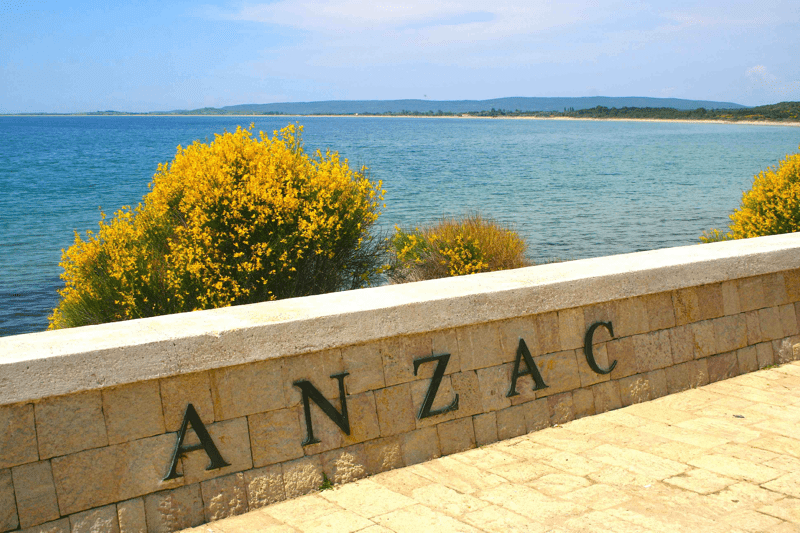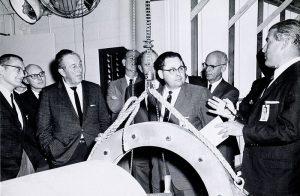
Boats carrying Australian, British, and New Zealand soldiers, advancing towards the shore, were all nervous about what awaited them, gripping their rifles. Captain Richard Willis, commander of C Company said, “It might have been a deserted land we were nearing in our little boats, then crack.”1 There was a door at the front of the boat that opened, and the machine gun fire was insane. Soldiers jumped off the boat fearing for their lives, equipped with their rifles and their 70-pounds worth of equipment. Some of them died instantly, but some made it to shore, only to be cut down by the barbwire that covered the shoreline, Captain Richard Willis described.2

It was war, the Great War, and the British and French troops needed to defeat the Ottoman Empire in order to get access to the Dardanelles straits. Their effort became known as the Gallipoli Campaign. Originally it was only a naval battle. With a fleet of eighteen warships, both British and French navies made an attempt to force their way through the Dardanelles. However, the Ottomans were too strong for them, and the attempt was a failure.3 The reason the Dardanelles were appealing at first was that they believed that it would not require many troops for this operation. How wrong they were. The Gallipoli campaign was conducted by General Sir Ian Hamilton with the plan on the 25th of April, 1915, to land at strategic points across the Gallipoli peninsula, with the ultimate goal of disarming the Ottoman forts at Kilitbahir, enabling the British navy to pass through the Dardanelles.4 The Anzacs were planning to land on Z beach as they were all code worded to S, V, W, X, and Z, all located at different points on the Peninsula. Z beach, located north Kabatepe, was planned to capture Hill 971 and another hill called Maltepe, and then move towards the Dardanelles and reinforce the British troops.5
April 25, 1915, the landing around Ari Burnu on the western side of the Gallipoli Peninsular was a complete mess, with the loss of 5,000 soldiers on the peninsula alone.6 Due to the horrific casualty number, it is now known as the ANZAC cove, in honor of these men. Gallipoli has become a defining moment in history for both Australian and New Zealand soldiers by defining both soldiers’ characteristics: endurance, determination, initiative, and brotherhood. For the Ottomans soldiers, it was the beginning of the decline in their domination of the war.7

The number of deaths in the trenches were diabolical. Over the whole eight months of the Gallipoli campaign, from April 25 to January 9, the allies lost 250,000 people, and the Ottomans lost around the same number. However, the initial landing at Gallipoli tallied up 60,000 people across all beach landings.8 Gallipoli was deemed a total failure overall. With so many casualties and not being able to achieve the objective of getting the naval ships through the Dardanelles, it has gone down in history as a failure of World War I. However, in Australian and New Zealand eyes, they are deemed heroes, going against all odds, fighting out numbered, and given the impossible you could say, for example the Battle of Lone Pine. But they were still able to carry out their duty and have gone down in history as imperishable.9
- Joshua Hammer, “A New View of the Battle of Gallipoli, One of the Bloodiest Conflicts of World War I,” Smithsonian.com, Febuary 01,2015. ↵
- Joshua Hammer, “A New View of the Battle of Gallipoli, One of the Bloodiest Conflicts of World War I,” Smithsonian.com. Febuary 01, 2015. ↵
- “The Anzac Portal,” Why Did Anzacs Land at Gallipoli? | The Anzac Portal ↵
- “Gallipoli: The First Day Centenary Edition,” Gallipoli Campaign, abc.net.au. ↵
- “Gallipoli: The First Day Centenary Edition,” Gallipoli Campaign, abc.net.au. ↵
- Nigal Steel, “What You Need To Know About The Gallipoli Campaign,” Imperial War Museums, June 26, 2018. ↵
- Nigal Steel, “What You Need To Know About The Gallipoli Campaign,” Imperial War Museums, June 26, 2018. ↵
- David Saul, “Time to Put the Record Straight on Gallipoli,” The Telegraph, April 25, 2015. ↵
- David Saul, “Time to Put the Record Straight on Gallipoli,” The Telegraph, April 25, 2015. ↵



36 comments
Gabriel Dossey
i think that this article shows the struggle between the value of human life and strategic positioning in wars. The disdain for life shown by the brits is crazy but the result makes you question if it was worth it. were more lives spared or lost with the decisions made. I never knew about this fight much less ww1 as ww2 is usually what is talked about. good job.
Antoinette Johnson
Heroes are not defined by the amount of battle they win or the glory they gain in battle. Gallipoli, are heroes. Even though, they experienced a lot of causalities. They still fought against the odds and for their land. I believe they are heroes not for what they have won, but for willingness to continue fighting no matter what the odds were.
Peter Coons
The Gallipoli Campaign truly was one of the most poorly executed battles in WWI. The Allies, rather than cut their losses after the failed naval operation, decided that sending in the colonies of Britain as cannon fodder would be a much easier pill to swallow. The disregard for the lives of their countrymen by the British was unacceptable, yet the Australian and New Zealand troops fought for that stretch of land like the war tilted on it, and were it not for them, the Ottoman’s would still be a nuisance in the war far after the defeat of the Germans.
Samantha Luckey
This is an interesting article regarding a less-known event. Despite my love of history, I lacked the knowledge regarding this event. This author was able to establish a historical background that engaged the reader to continue reading on till the very bitter and tragic end. I appreciate this article’s illustration of this brutal conflict that occurred in Gallipoli. While certain events in World War I continue to be over shadowed, this article was able to show that events can still be learned from tragic events.
Jose Sanchez
This article was very informative. While I am an avid lover of history, I lack knowledge in the area of World War 1. This article did a good job of conveying information and explaining the history and significance of Gallipoli. While the mission did end in utter failure, it is nice to see that the efforts of those men were not in vain. They are remembered today for their valiant efforts.
Natalie Thamm
This was a really interesting article on a topic that I had not been aware of before. I really like how the author ended on a high note of how while the operation was a failure, it helped to reinforce belief in the Australian and New Zealand men fighting the battle. But, with that said, the devastation of the operation was massive, and shows that just because something in war may seem like it will be easy, it can quickly go the other way.
Dylan Sanchez
Such a sad story to read of thousands of soldiers losing their lives for some phony monarchs. I always enjoyed reading about Gallipoli and thought that it was very unrecognized in comparison to most other battles. The allies were very brave and will be remembered for their fearless fighting.
Alyssa Garza
Great article it looks like the though less of their enemy and they were so wrong about them. The Ottomans were ready, and they prepared well for their enemy attack. It shocked there enemy once they attempted to reach land that they don’t have a chance. It’s great that there being remember for their sacrifice. I’m surprised I don’t remember this since it’s such an interesting topic.
Didier Cadena
This was a very interesting article. I was not too familiar with the Battle of Gallipoli, so this was able to help me learn a little bit more about the event. The failure of the battle seemed monumental, with so many dead and the battle nearly forgotten about. The article does a great job of putting all of the information together and still make it interesting to read.
Jose Fernandez
This article is very interesting and informative. I didn’t know about these events and I had never heard about Gallipoli in my life. Even though this is a short writing, the author did a great job presenting the most important facts about the events. I think this had a very sad outcome, given the amount of lives that were lost. I liked this article because I believe it is important that people know about soldiers who sacrificed their lives for their country.